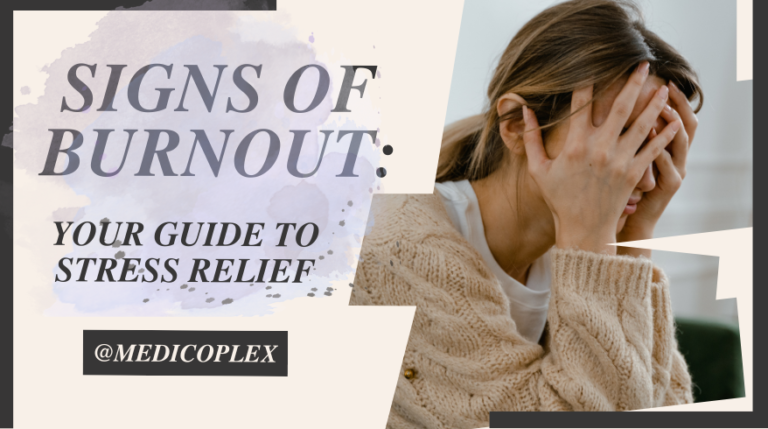Introduction
In today’s fast-paced world, many people are overwhelmed by work, responsibilities, and constant digital connectivity. While a little stress is normal, long-term unrelieved stress can lead to burnout—a state of physical, mental, and emotional exhaustion. Burnout doesn’t happen overnight, but it can sneak up on you slowly. Ignoring the warning signs can result in serious consequences for your health, relationships, and career.
In this article, we’ll explore the top signs of burnout, how to differentiate it from regular stress, what causes it, and how you can recover and prevent it.
What Exactly Is Burnout?
Burnout is a chronic stress response that occurs when you’re overwhelmed, emotionally drained, and unable to meet constant demands. It often builds up over time and can sneak up on you if you’re not paying attention. Unlike regular stress, which can be short-lived and even motivating in small doses, burnout leaves you feeling empty, hopeless, and detached.
According to psychologist Herbert Freudenberg, who coined the term in the 1970s, burnout often affects high achievers those who are driven, passionate, and eager to make a difference. Ironically, it’s this very commitment that makes them vulnerable.
Constant Fatigue and Lack of Energy
One of the first and most noticeable signs of burnout is chronic fatigue. This isn’t just being tired after a long day it’s a deep, persistent exhaustion that sleep and rest don’t fix.
You might:
- Wake up feeling just as tired as when you went to bed.
- Feel physically and mentally drained throughout the day.
- Struggle to find the motivation to complete even basic tasks.
Fatigue from burnout feels different. It affects your body, your mind, and your spirit, often leading to a state of complete exhaustion.
Cognitive Fog and Forgetfulness
Burnout affects your brain function. If you’re frequently forgetting things, struggling to concentrate, or feeling mentally “fuzzy,” you may be experiencing what’s often referred to as brain fog.
Cognitive symptoms of burnout can include:
- Difficulty focusing
- Poor memory
- Slower thinking or reaction time
- Struggling to make decisions
These issues stem from the body being in a constant stress response, which impacts the prefrontal cortex the part of the brain responsible for higher-level thinking and decision-making.
Irritability and Mood Changes
You may notice that you’re snapping at coworkers, getting angry at your partner over small things, or feeling increasingly cynical and negative.
Burnout can lead to:
- Mood swings
- Frustration or anger
- A sense of hopelessness or emotional numbness
- Loss of enjoyment in things you used to love
These changes are red flags. When burnout begins to affect your emotions and behavior, it’s a clear sign that something deeper is going on.
Reduced Performance and Productivity
Another major sign is a noticeable drop in work performance. You may find it hard to meet deadlines, procrastinate more than usual, or feel like your work has lost meaning or value.
Common signs include:
- Feeling ineffective or unaccomplished
- Avoiding responsibilities
- Feeling detached or unmotivated at work
- Frequently making mistakes or missing details
If you’re once a high performer and now struggling to keep up, burnout could be the reason.
Physical Symptoms
Burnout doesn’t just impact your mind it shows up in your body too. Prolonged stress can weaken your immune system and cause a variety of physical symptoms.
such as:
- Headaches or migraines
- Muscle tension or pain
- Gastrointestinal problems
- Increased heart rate
- Trouble sleeping or insomnia
- Frequent colds or illnesses
Many people visit doctors for physical symptoms, not realizing that stress and burnout are the underlying cause.
Emotional Detachment and Isolation
You might feel disconnected from others even those you care about. You may begin to withdraw socially, cancel plans, or avoid interactions because they feel overwhelming.
Signs include:
- Feeling emotionally distant
- Losing empathy or compassion (especially in caregiving roles)
- Avoiding coworkers, friends, or family
- Feeling alone even in a crowd
This emotional distancing is your mind’s way of protecting itself from further overwhelm, but it also increases feelings of isolation and depression.
Lack of Motivation and Increased Cynicism
When you’re burned out, even things you used to be passionate about may start to feel meaningless. You may feel like you’re just going through the motions, or begin to develop a cynical or negative outlook on life, work, or people around you.
This might sound like:
- “What’s the point?”
- “No one appreciates my effort anyway.”
- “I can’t do this anymore.”
Losing your sense of purpose and feeling constantly negative are serious signs of emotional exhaustion.
Burnout vs. Stress: What’s the Difference?
| Stress | Burnout |
| Over-engaged | Disengaged |
| Emotions are overactive | Emotions are blunted |
| Leads to anxiety | Leads to depression |
| Physical toll is high | Emotional toll is high |
| You still care | You feel like you can’t care anymore |
Burnout is what happens when stress goes unmanaged for too long. Recognizing the shift can help you act before things get worse.
How to Recover from Burnout?
The good news is that burnout is reversible but it takes awareness, effort, and time. Here’s what you can do:
Acknowledge It
You can’t fix what you won’t face. Be honest with yourself and others about how you’re feeling.
Set Boundaries
Say no to extra responsibilities, delegate where possible, and protect your personal time.
Take Breaks
Use your vacation time. Take regular breaks during the day. Even a 10-minute walk can help reset your brain.
Prioritize Sleep and Nutrition
Lack of sleep makes burnout worse. Fuel your body with whole foods, stay hydrated, and aim for 7–8 hours of sleep per night.
Talk to Someone
Whether it’s a friend, coach, therapist, or doctor talking helps you process your emotions and get support.
Reconnect with Purpose
Find small ways to do things that bring you joy or a sense of meaning whether it’s a hobby, volunteering, or simply slowing down.
Consider Professional Help
If burnout has led to depression or serious anxiety, seek help from a mental health professional.
FAQs: Signs of Burnout
1. What are the most common signs of burnout?
A: Common signs include constant fatigue, lack of motivation, mood swings, insomnia, and physical symptoms like headaches or digestive issues.
2. Can burnout cause physical health problems?
A: Yes. Long-term burnout can weaken your immune system, increase heart disease risk, and cause sleep and digestive problems.
3. How long does it take to recover from burnout?
A: Recovery varies. Some people feel better after a few weeks of rest, while others may take months. It depends on the severity and support system.
4. Is burnout the same as stress?
A: No. Stress is temporary and can often be motivating. Burnout is the result of chronic stress and leads to emotional and physical exhaustion.
5. Can therapy help with burnout?
A: Absolutely. Talking to a licensed therapist can help you understand the root causes and build coping strategies to recover and prevent future burnout.
6. How do I know if I need to quit my job due to burnout?
A: If your workplace is toxic, offers no support, and your mental health is suffering despite trying to set boundaries, it might be time to consider a change.
Your mind and body are speaking to you don’t ignore them.
If you found this article helpful, share it with someone who may be struggling silently. Let’s create a healthier, more supportive world one burnout-free person at a time.
Conclusion
Burnout is real, serious, and more common than you think. It’s not just about being tired it’s a deep physical, emotional, and mental exhaustion that can impact every part of your life. The earlier you notice the warning signs, the easier it is to recover and protect your health.
Don’t ignore what your body and mind are telling you. Take a step back, reevaluate, and give yourself the space to heal. You don’t have to keep pushing. Your well-being is worth it.


